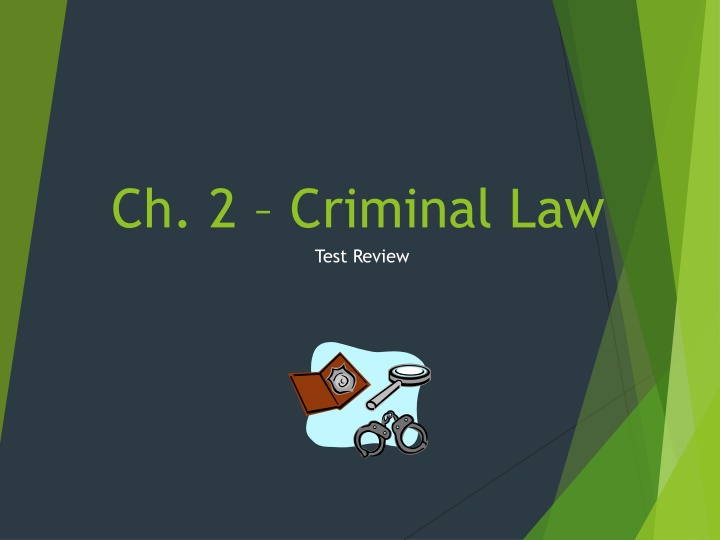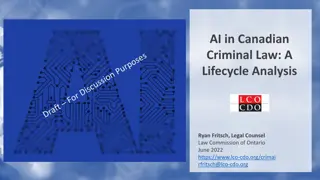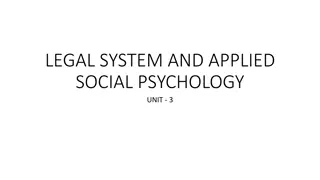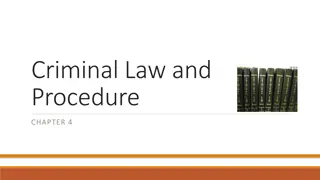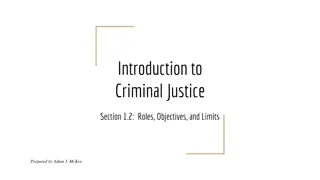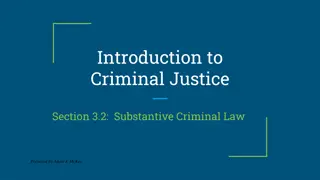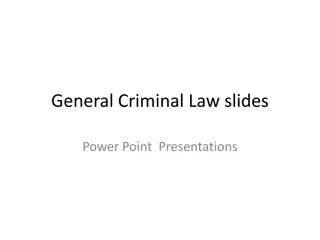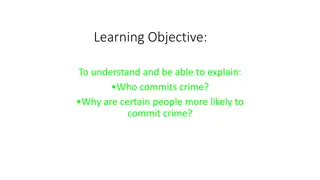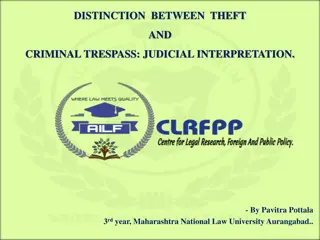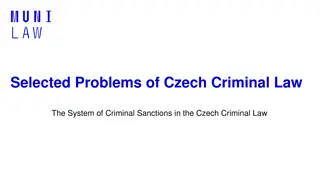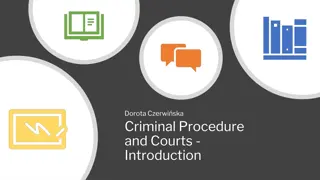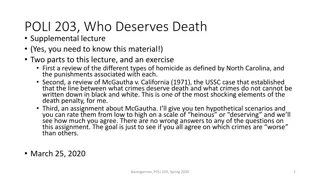Overview of Criminal Law: Elements, Classifications, and Punishments
The fundamental elements of criminal law, including the classification of crimes as felonies or misdemeanors, the two defining elements of a crime, the concept of malice aforethought, and common types of crimes against people, property, and business. Discover key defenses to crimes and the importance of understanding appropriate sentencing.
Download Presentation

Please find below an Image/Link to download the presentation.
The content on the website is provided AS IS for your information and personal use only. It may not be sold, licensed, or shared on other websites without obtaining consent from the author.If you encounter any issues during the download, it is possible that the publisher has removed the file from their server.
You are allowed to download the files provided on this website for personal or commercial use, subject to the condition that they are used lawfully. All files are the property of their respective owners.
The content on the website is provided AS IS for your information and personal use only. It may not be sold, licensed, or shared on other websites without obtaining consent from the author.
E N D
Presentation Transcript
Ch. 2 Criminal Law Test Review
Crimes are classified as felonies or misdemeanors. Felony A major crime punishable by imprisonment or death. Misdemeanor A less serious crime with a less severe penalty.
In class we discussed that a crime is defined by two elements. List those 2 elements: Criminal Act Required State of Mind (Intent) Why is MOTIVE not one of the DEFINING elements? It may strengthen a case after an element is proven.
What does malice aforethought mean? Evil intent
True or False Each statute that defines a crime must specifically explain the conduct that is forbidden by that statute. True
Crimes Against People Homicide Murder Manslaughter Assault Battery Kidnapping Rape Sex offenses Kidnapping
Crimes Against Property Burglary Larceny Embezzlement Robbery Arson
Business Related Crimes AKA White-Collar Crimes Evading Income Taxes Defrauding Consumers Cheating with False Weighing Machines Conspiring to Fix Prices Making False Fire & Auto Insurance Claims Engaging in False Advertising Committing Bribery Engaging in Political Corruption Embezzling
4 Most Common Defenses to Crimes Insanity Entrapment Self-defense Defense of family members
Take out your Ch. 2 Study Guide
An appropriate punishment for a crime. sentence
Major crime punishable by imprisonment or death. felony
Breaking and entering of a dwelling at night to commit a felony. burglary
Person who is accused of a crime. defendant
Unlawful killing of another human being with malice aforethought. murder
Party that accuses a person of a crime. Prosecution AKA Prosecutor
Less serious crime with less severe penalty. misdemeanor
Unlawful taking away and carrying away personal property of another accompanied by violence. robbery
Attempt to commit a battery. assault
A citizen who levies war against the United States commits treason. True
A felony is a minor crime. False A major crime punishable by imprisonment or death
The prosecution brings a criminal to court. True
A crime is defined by the criminal act alone. False
Motive plays an essential part in proving criminal liability. false
Insanity is recognized as a valid legal defense. true
The oldest test of insanity is the American Law Institute Test (ALI). false It is the Mac Naughten Rule
Entrapment is no longer recognized as a valid legal defense. false
Defense of family members is recognized as a valid legal defense. true
Each crime must have an exact definition. true
The killing of one human being by another is always known as murder. false
The definition of first degree murder is the same in all states. false
Involuntary manslaughter occurs when someone, while committing an unlawful or reckless act kills another human being. true
Giving anything of value to public officials to influence their official activity is bribery. true
Fines are used to punish offenders when their crime is considered a lesser offense. true
Good behavior is not a factor if a criminal was sentenced under a statute requiring a definite sentence. true
Doris Alexander was arrested for aggravated assault after she allegedly attacked a stranger in the park. She argues that prosecution will be unable to convict her because she had no motive for the attack is she correct? NO Motive is not an element of criminal liability.
Fred Mandrake returned to his apartment one evening to find his son being in the kitchen. Fred hit and severely injured his son s attacker. Does Fred have a valid legal defense? Yes Defense of others is a valid legal defense.
While driving an automobile 85 miles per hour in a zone in which the speed limit was 65 miles per hour, Terri Charlton accidentally struck and killed a child. Has she committed second-degree murder? NO She committed involuntary manslaughter, which is killing another person during the commission of an unlawful or a reckless act.
Doreen Levesque, while shopping at a local store, took an item of merchandise from the counter and intentionally walked out without paying for it. Has she committed robbery? NO She has not committed robbery, because it requires a taking from the person of another; she has committed shoplifting.
Sylvia Rich found an old, unsigned, unwitnessed will that her aunt had written. Sylvia signed her aunt s name on the will. Did Sylvia commit forgery. NO To be a crime, the item forged must have some legal effect; an unwitnessed will has no legal effect.
